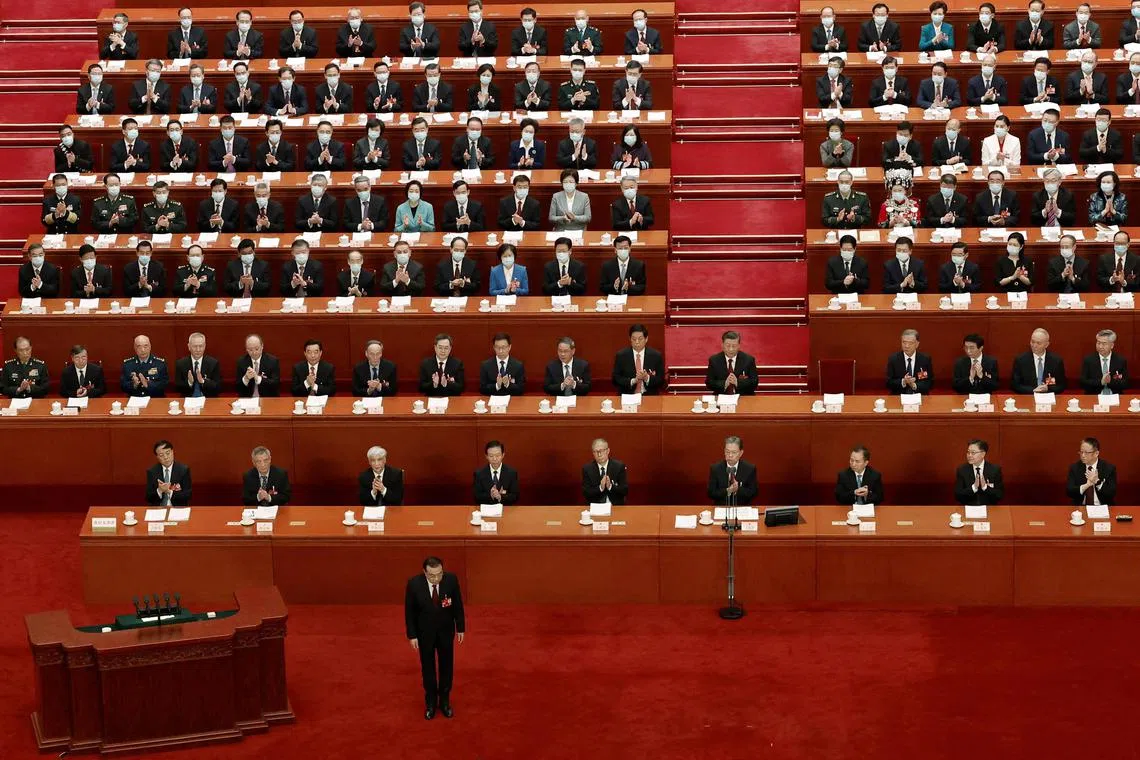China sets GDP growth target of around 5% for 2023, after missing last year’s mark
Sign up now: Get insights on Asia's fast-moving developments

Chinese Premier Li Keqiang bows before delivering the annual work report at the opening session of the National People's Congress in Beijing on Sunday.
PHOTO: REUTERS
BEIJING – China has set its lowest growth target in three decades of around 5 per cent,
As it emerges from the shadows of its now-abandoned zero-Covid policy,
China’s 3 per cent growth in 2022
Economists project that the world’s second-largest economy will grow by more than 5 per cent in 2023. The International Monetary Fund recently revised China’s 2023 growth outlook upwards to 5.2 per cent, and expects the Chinese economy to contribute a third of global growth in 2023.
Delivering his final work report on Sunday at the opening of this year’s legislative session, Mr Li, who is set to retire
It is “keenly aware that China is still a large, developing country” and “remains in the primary stage of socialism with prominent imbalances and inadequacies in its development”, said Mr Li to an audience of legislators, diplomats and journalists at the Great Hall of the People.
Global inflation is high, while “external attempts to suppress and contain China are escalating”, warned the Premier. At home, consumption has remained soft and the job market unstable. Some officials have failed to fulfil their duties, while corruption remains a problem in the bureaucracy.
“We must face these problems and challenges squarely, make every effort to make improvements, and do all we can to live up to the people’s trust,” he said.
This will fall on a new leadership team – including a new prime minister.
To spur consumption, the government will have to restore consumer and investor confidence battered by three years of Covid-19, said Professor Zhao Xijun, deputy dean of the School of Finance at Renmin University.
Raising incomes and creating jobs so people will have more money to spend will be key, “although they will have to put in more work in this aspect”, said Prof Zhao.
Unlike in previous years, this work report has been more explicit about the difficulties that China faces in the near and longer term, and is “a reflection of the leadership’s understanding of these problems”, said Associate Professor Li Mingjiang from the S. Rajaratnam School of International Studies.
One of the biggest headaches for the government would be to create enough jobs for a record 11.58 million fresh university graduates in 2023.
Mr Li said the government aims to create 12 million jobs in urban areas in 2023, up from its 11 million target in 2022. He also vowed to cap unemployment in urban areas at 5.5 per cent, similar as in 2022.
Spending will also increase in a number of areas vital to its economic growth and security, such as infrastructure building, research and technology development, and defence. In particular, the military budget will increase by 7.2 per cent
Prof Li noted: “This is taking place in the context of a challenging domestic economic situation and a much slower economic growth rate in comparison to past years.
“It is a reflection of Chinese leaders’ worry about China’s national security.”



